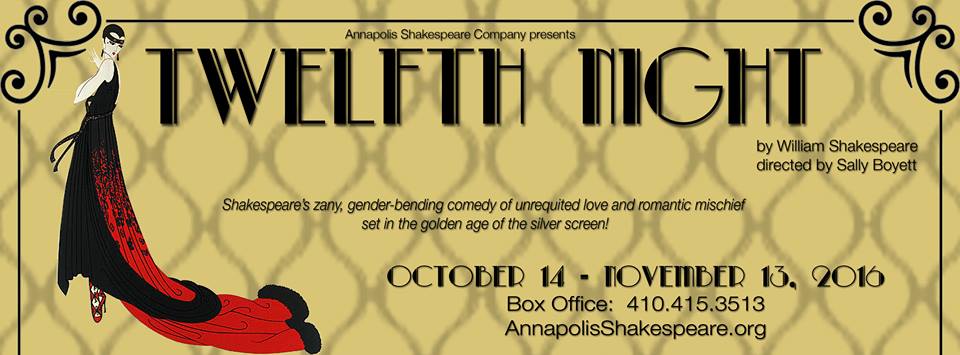I say there is no darkness but ignorance, and to remain ignorant of the truly sensational production of Twelfth Night that is gracing itself upon the stage of the Annapolis Shakespeare Company’s studio stage would be to remain steeped in the depths of an aphotic gloom of indescribable proportions. Directed by the company’s Artistic Director— Sally Boyett— this reimagined, innovative approach pays homage to the glistening golden era of Hollywood’s silver screen, all the while remaining true to the sharp witticism and clever craft of Shakespeare’s original text. Aesthetically and aurally pleasing the production is practically without fault, a remarkable achievement that could easily be the finest mounted by the company in recent history.
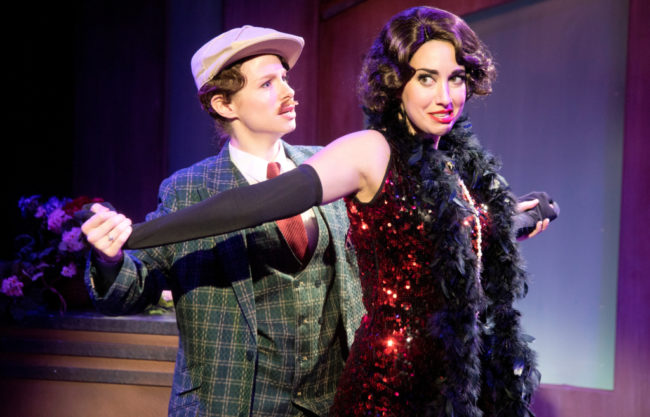
Director Sally Boyett brings a fully actualized and highly nuanced vision to Shakespeare’s gender-bending comedy of disguise, which not only penetrates the play’s framework but diffuses into the deeper layers of the play’s core, mainly in the text and overall characterization of the characters. The scene is 1929 in Hollywood, California and the silver screen and silent film become a vessel to carry this comedy from stage to the audience with a glorious nostalgia and honored nod to a glorious era that time has all but forgotten. Working with Composer and Music Director James Fitzpatrick, the pair cultivate a lively scene, vibrant and thriving with the verve of old Tinsel Town, just the way it was meant to be remembered.
Fitzpatrick sits off stage at an old upright piano, plinking and plunking away throughout the performance. Fitted to the aesthetic in his dapper duds, this pianist character— Curio— becomes an integral part of the working concept of the show. The music itself is lively and well-balanced with the emotional grandeur of the piece. Villainous foreboding or swells of romance tinkle in live-time, adding to the performance a heightened sense of action and pathos, giving the audience a keen sense of the old silent film. But the show’s immersion in that era does not stop there. With Boyett’s propensity toward Choreography, hints of Vaudeville and the old razzle-dazzle routines work their way into the performance, particularly where Feste the fool is concerned. The curtain-call finale is a fine example of this cultural inclusion and an excellent display of Boyett’s choreographic skill.
Furthering the exploration of the Tinsel Town takeover of Twelfth Night, the physical comedy which imports itself whenever Feste takes the stage, or Sir Toby, Air Andrew, and Fabian find themselves together, is fondly reminiscent of the Marx Brothers’ styling of physical shtick. With a hint of The Three Stooges thrown into the mix the iconic “spying on Malvolio” scene becomes an uproarious hoot by way of paying homage to these comic classics which take root in the period. Characterizations across the board follow suit, with the legendary screen gems of yesteryore informing the stances, postures, and overall delivery of the characters on stage
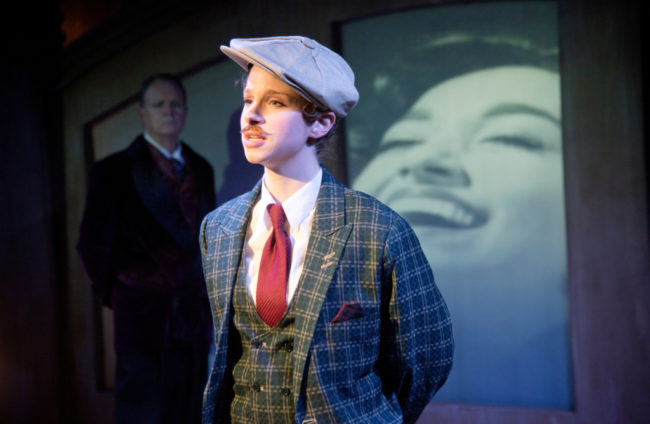
Boyett’s use of grainy videography is another sparkling element of the production that deserves a nod. Filmed and cultivated by Director of Photography, Joshua McKerrow, this infusion of silent video work adds another glittering layer of yesteryore to the performance. Whenever the Duke Orsino is lamenting his unrequited love of Olivia, a Hollywood-style slow-motion capture plays with softened edges in the background and the effect is striking. This device is used in other scenes, but none so prominently or with such great effectivity as it is when reeling through the many faces of the lovely lady Olivia. Sharpening the notion that the play lives and breathes in the era that Boyett has settled upon is the aid of Dialect Coach Nancy Krebs. Subtly coaxing a Trans-Atlantic sound with polished Brahman diction for Viola, the Duke, and Olivia. Krebs’ use of this Hollywood sound is sparing so as not to completely overwhelm Shakespeare’s text and give it too much of a hokey or campy feel.
The crowning glory which ties all of the production elements together in Boyett’s vision is the sartorial selection procured by Costume Designer Sandra Spence. Demonstrating an intricate working knowledge of both form and figure when it comes to 1929 in Hollywood, Spence lavishes decadence upon both the Lady Olivia and Duke Orsino. Not unlike Jean Harlow or Norma Talmadge, the look achieved for Olivia is true Hollywood starlet: the knotted pearl lavalier, the pristine makeup plot, the ruched black gloves, each component in place to procure the perfect look. Spence does an equally dapper job of outfitting the gentlemen what with their spiffy suits, classy cantoniers, and generally polished looks. Even the servants fit the period in an elegant fashion, particularly Malvolio with his pristinely pressed linens and upwardly mobile fashion sense.
Though their stage time be but brief, both Joshua Witt, as Antonio, and Bill Dennison as Sebastian, find fair footholds for their characters in this late 1920’s landscape. The pair blend easily into the confusion of Shakespeare’s plot and work well within the constructs that Boyett has created. The same can be said for James Fitzpatrick, who despite being outside of the action on the piano, occasionally finds himself drawn into the circus as things unfold around his musical enhancement.
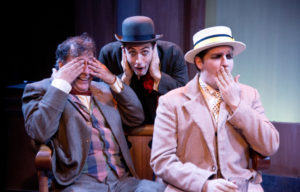
The trio of comedians, led by the perpetually soused Sir Toby Belch (Tony Tsendeas) makes their mark on the production with their physical shtick. Tsendeas, joined by Kim Curtis as Fabian and Jonny Weissgerber as Sir Andrew Aguecheek, find great wallops of comedy to punch about with, particularly when it comes to their drunken carousing into the late hours of the night and the wee hours of the morning. Tsendeas has a natural ease to which he delivers his drunken gait, comic yet balanced so as not to tip over into the category of easily overdone. Supported fully in his antics by the boisterous Maria (Renata Plecha), Tsendeas creates a loveable ass out of the Sir Toby Belch character. There are even well-developed hints of chemistry between himself and Plecha— who on the whole holds her own in this gaggle of gentlemen when it comes to clear and concise textual deliver as well as comic timing— furthering the motivation for their hilarious plotting against the aloof Malvolio.
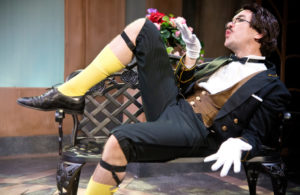
With an austere regard of control, Brian Keith MacDonald takes with ease to the fusty reservations of Malvolio. Resolute in his unshakeably prudish foundations, MacDonald is a screaming delight who all but steals the show with his own severity. Groaning, rolling his eyes, and refusing to blink or budge in the face of Sir Toby, MacDonald delivers Malvolio with the utmost intensity, going so far as to belch brimstone at the rowdy and rebellious partying lot when they make too much noise in the wee hours. MacDonald’s transformation as the play progresses is hysterical, particularly the way he sweeps through the letter, once discovered. The maddening exertion which he extends trying to smile will all but leave one in stitches with laughter; his characterization could not be more entertaining.
While MacDonald may be the king of sarcastic humors, he’s not the only character with a disposition most standoffish. Steven Hoochuk, as the nobly gracious Duke Orsino, is prone to melancholic moodiness; he is the epitome of a Bogart pining away for an unobtainable Bacall. All of this is done with his vividly expressive facial features. Watch closely during the song as his facials belay a world of text toward Viola (Laura Louise Smith) and again during the final scene where all of the wrongs make their way to right. Smith, who takes on the double identity of Viola and then Cesario, plays the character with great aplomb, delivering exactly what one might expect from a woman finding herself in such a predicament in 1929.
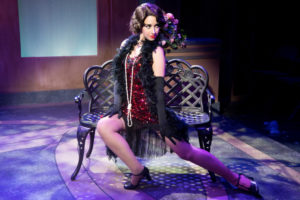
In true Hollywood diva fashion, Olivia Ercolano is the exacting impression of the Hollywood starlet that Olivia was meant to be. Channeling forth the scorn of Norma Desmond into her girlish charm in matters that involve rejection (be it from Cesario or of Orsino), Ercolano is an utter delight to watch. Her body language is demure but suggestive, informed by the style of the time. Watch the way she sits, the way she stands and holds her body, these little nuances of the character are what bring Olivia to life inside Boyett’s Tinsel Town vision.
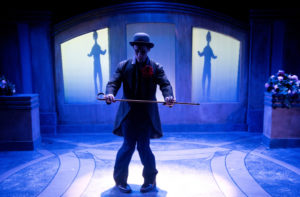
Wise enough to play the fool, Jamison Foreman is possessed of great wit as Feste. With a delectably delicious voice featured several times throughout the performance, Foreman regales the audience with not only his sweet singing sound but his smashing soft-shoe and dance routine in addition to his sharply honed humors. Abreast with lively energy, whenever Foreman’s character graces the scene the audience is in for a treat. His energetic magnitude pulls the gravitational focus of the play to his through-line, making him a remarkable addition to each and every scene.
If I have left any good reason unspoken as to why a ticket to Annapolis Shakespeare Company’s Twelfth Night should be procured at the earliest convenience, surely it be something of my negligence and nothing of my purpose. Innumerable are the praises for this production, one of the most thoroughly articulated and well executed in the company’s professional history.
Running Time: Approximately 2 hours and 20 minutes with one intermission
Twelfth Night plays through November 13, 2016 at the Annapolis Shakespeare Company in their Studio111— 111 Chinquapin Round Road Suite 114 in Annapolis, MD. To purchase tickets, call the box office at (410) 415-3513 or purchase them online.

